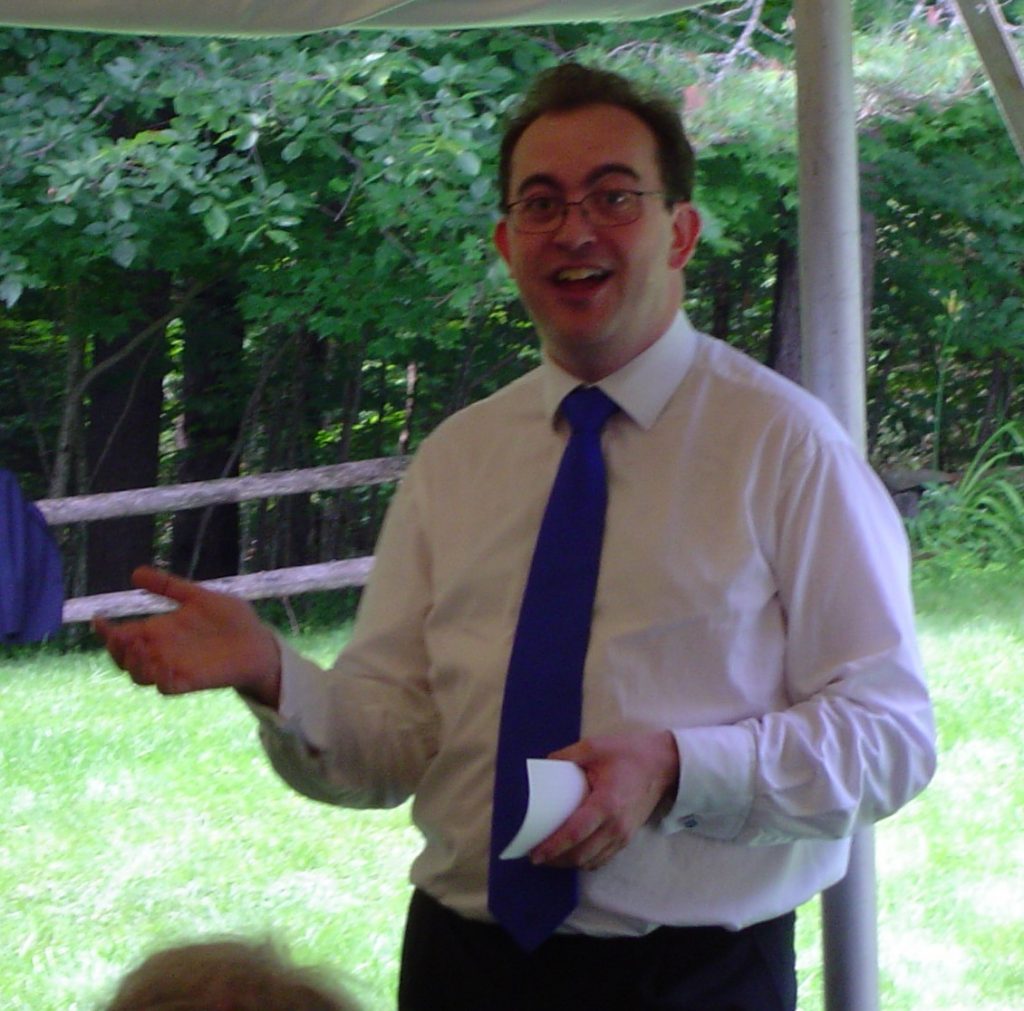
This photo was taken in 2004 at the wedding in the US of a very good friend – with whom I now work occasionally – where I was his best man. It was one of four occasions I was best man; I should add that on each occasion it was to a different groom, all of whom have remained close friends.
Anyone who’s given a speech at a wedding knows it can be nerve-wracking. The expectations on you as best man are quite significant: ensure you engage with guests throughout the wedding, so you understand their sensitivities; be amusing in your speech, but don’t try too hard. Get it wrong – which I saw happen at the wedding of other good friends – and you can alienate yourself from a family for years. Hearty applause says you got it right.
What relevance does this have to the world of mathematics and the world of work?
I believe you get asked to be best man for a host of reasons (and being a man is not necessarily one of those). I like to think you get asked, in part at least, because you’re trusted and because you can communicate effectively. Unless you’re extraordinarily blessed, those communication skills are ones you learn over years of practice and opportunity.
As the years have progressed, I’ve realised how fortunate I was to attend a school that allowed me to hone those skills. It may have been a Valleys comprehensive, but it had an active debating society and equally active music department, both of which we pupils were encouraged to be part of. Presenting – either vocally or holding an instrument – become an everyday part of school life for many of us. We had spreads in the local paper, for which we wrote articles. Let’s be under no illusions, though: if you stand on a stage at school, be prepared for the criticism that your teenage peers dish out. It can be brutal.
But it also provided the experience I needed at Oxford to become President of the Graduate Common Room. It gave me the confidence to sing solo in the College Choir. It provided the foundation I needed to comfortably give presentations at work on mathematical and other technical issues. It’s given me the confidence to sit in meetings with financiers, funding bodies, civil servants, politicians and many others, to discuss issues and constructively challenge what I hear, when required.
As we emerge from the pandemic, we’ll need to re-engage with people; we’ll need to communicate more, and differently. The platforms that we’ve all become used to – Zoom, Teams, and so on – have of course provided means by which we can work together during lockdown. Using these platforms has required changes of communication style; they have arguably created their own vernacular. However, everyone I’ve spoken to about the platforms says that while they provide a great way for established groups to work together, they’re not good for establishing links. The serendipity afforded by discussions on the way to and from the coffee machine simply isn’t there.
During the pandemic, we’ve also seen how data can be used and communicated – or perhaps misused and miscommunicated. When I studied the epidemiology of AIDS some thirty years ago for my undergraduate dissertation, little did I think epidemiology would become a word on everyone’s lips. Yet epidemiologists have been placed centre stage in the pandemic, with their predictions and warnings picked up by media across the globe. As all this has been occurring, so has analysis beneath the scenes about the potential long-term effects the pandemic will bring – not least on increased inequality.
We find ourselves facing a future in which I have no doubt data will feature in public discussions more broadly. Our decision makers will talk more about the data that supports public policy decisions. Our hybrid working environments – part home, part office – will require us to engage differently. All point to an increased need for solid communication skills, not least by those in mathematics and technology whose products and ideas are likely to find an audience more quickly than before.
As always, our future will be shaped by not only those in positions now, but those who are currently studying and starting on their career journey, however volatile that may seem. I say to all: hone your communication skills. They’re more valuable than you may think. And then practice your speaking skills at a wedding. What could possibly go wrong?